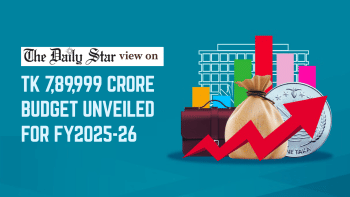Health and education sectors need greater budgetary attention

We are disappointed by the low budgetary allocations and limited attention that the health and education sectors have received in the just-unveiled budget for FY2025-26. In his budget speech, the finance adviser pledged that the government would focus on key areas such as education, healthcare, effective governance, civic amenities, and job opportunities, rather than prioritising physical infrastructure. However, in reality, there is inadequate reflection of these priorities in the proposed budget, particularly with regard to education and health. While Tk 95,644 crore has been proposed for the education sector and Tk 41,908 crore allocated for the health sector, these figures have frustrated educationists and health experts alike.
These two sectors have not only received insufficient allocations, but there is also a palpable lack of strategic planning for the execution of the funds. According to UNESCO recommendations, 4 to 6 percent of GDP, or 15 to 20 percent of a national budget, should be allocated to education. However, only 12.1 percent of the total budget, or just 1.72 percent of GDP, has been allocated to this sector. While the government has proposed some important initiatives—such as steps to raise enrolment in technical education and the launch of a new school feeding programme in 150 upazilas—these are not enough. The education sector requires critical reforms, which remain unaddressed in the budget.
According to UNESCO recommendations, 4 to 6 percent of GDP, or 15 to 20 percent of a national budget, should be allocated to education. However, only 12.1 percent of the total budget, or just 1.72 percent of GDP, has been allocated to this sector. While the government has proposed some important initiatives—such as steps to raise enrolment in technical education and the launch of a new school feeding programme in 150 upazilas—these are not enough. The education sector requires critical reforms, which remain unaddressed in the budget.
Similarly, the health sector has received only 5.3 percent of the total budget, ranking seventh among all sectors. This is far below the Health Sector Reform Commission's recommendation of 15 percent. While the finance adviser has announced some tax relief on the import of pharmaceutical raw materials and medical equipment—which would help reduce the cost of medicine—he has not clarified how the commission's recommendations will be implemented. Given the dismal implementation rate of the health budget in the outgoing year, special attention is required to ensure proper utilisation of funds in this sector.
We understand that the government is grappling with many challenges. But we hope it will overcome them and proceed with a clear roadmap to bring about the much-needed reforms in these sectors. The finance adviser has rightly pointed out the need to develop human capital, but for that to happen, we must prioritise both the education and health sectors, and also address unemployment, among other pressing issues. The government must take concrete initiatives to harness our demographic dividend for sustainable long-term growth. It should consider the suggestions made by experts and incorporate them into the budget before its finalisation.


 For all latest news, follow The Daily Star's Google News channel.
For all latest news, follow The Daily Star's Google News channel. 









Comments